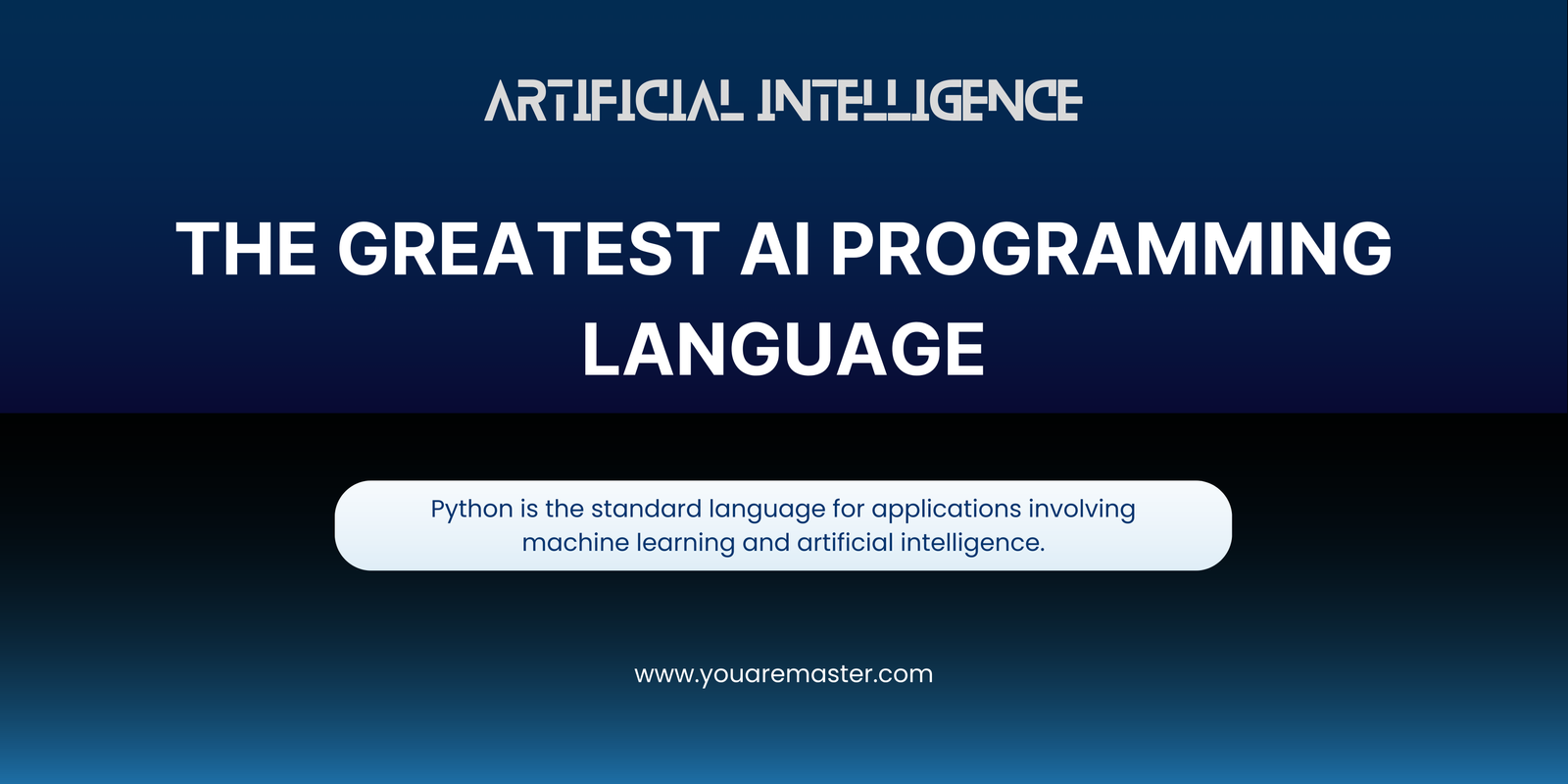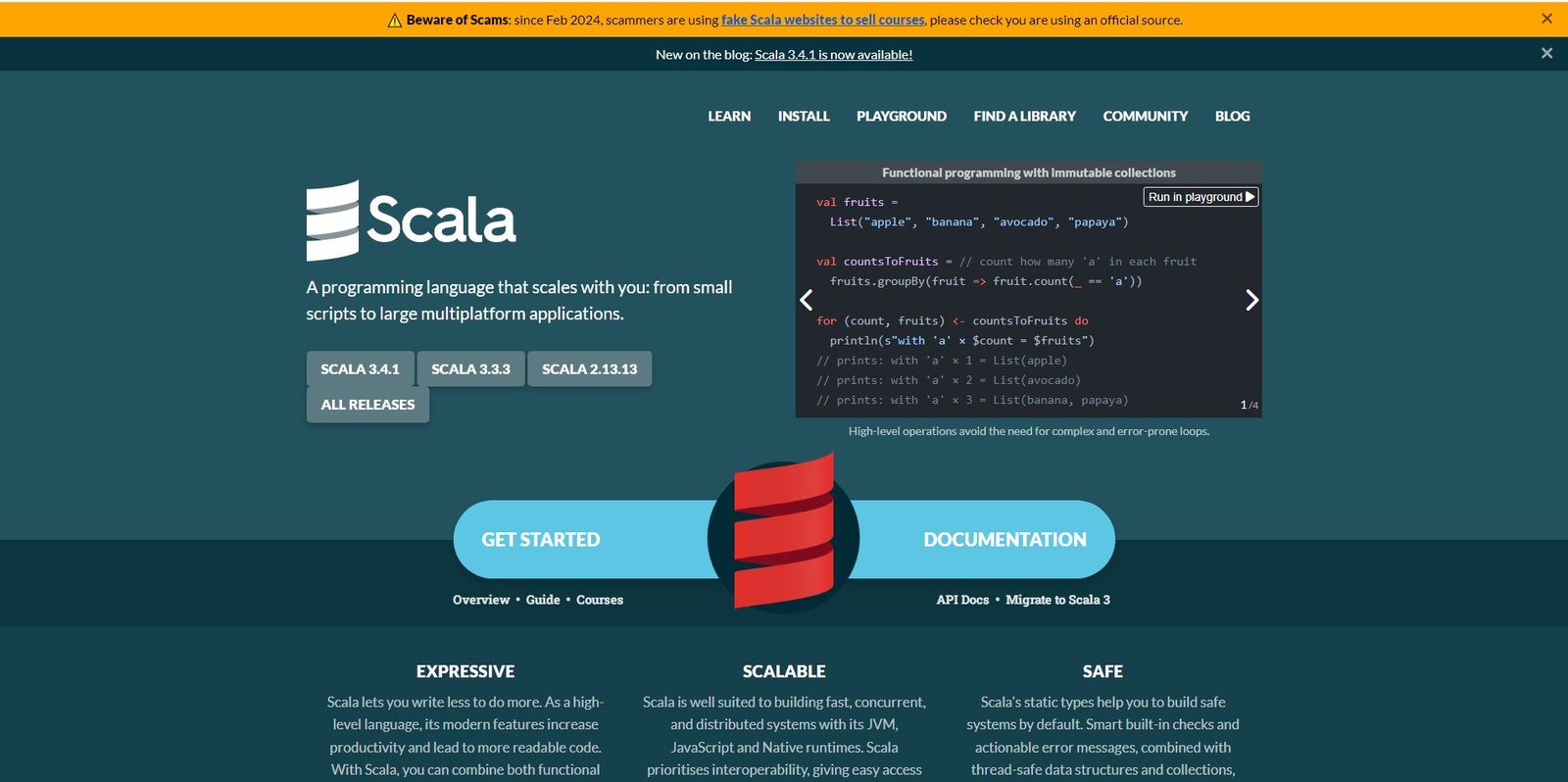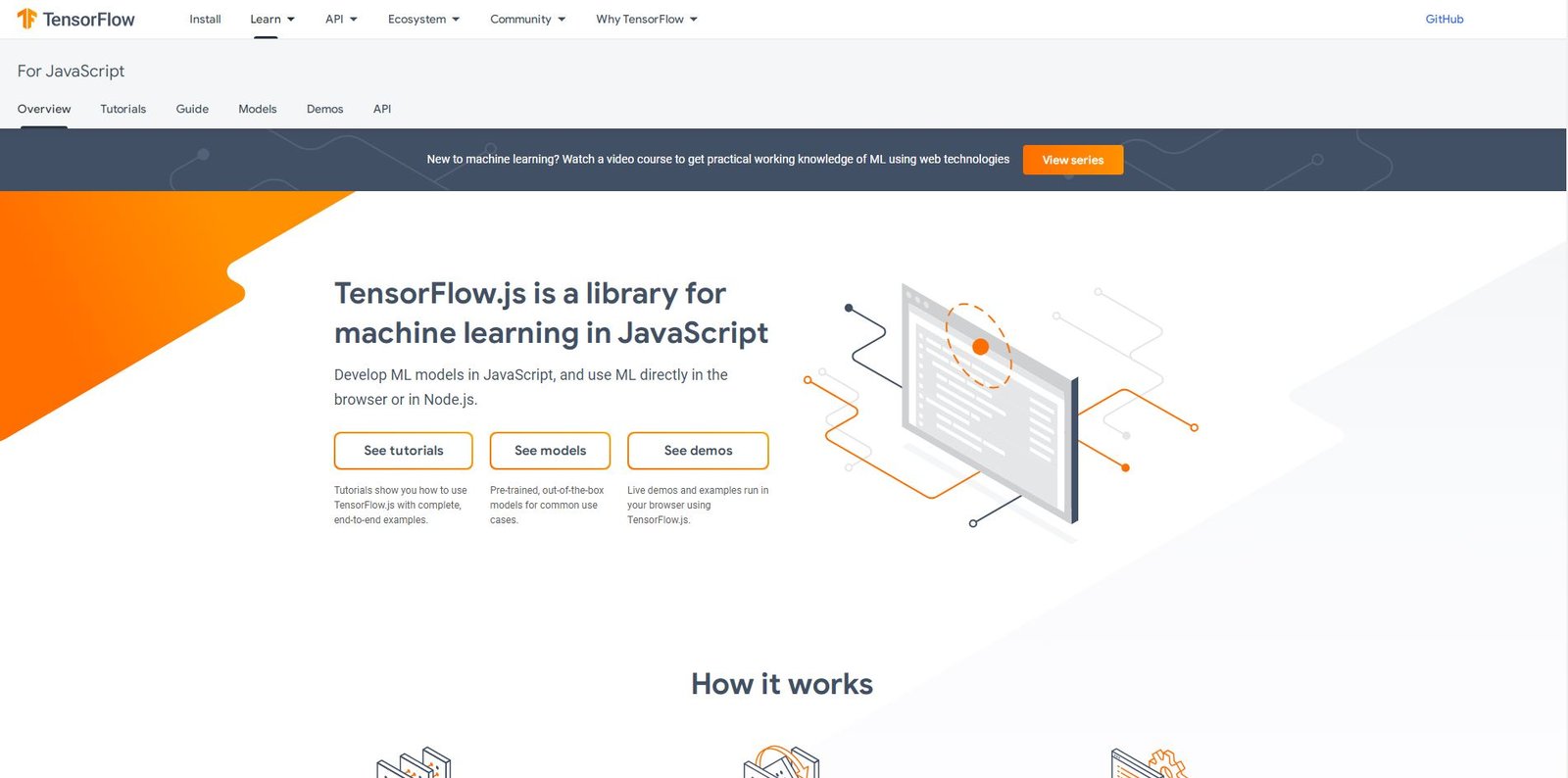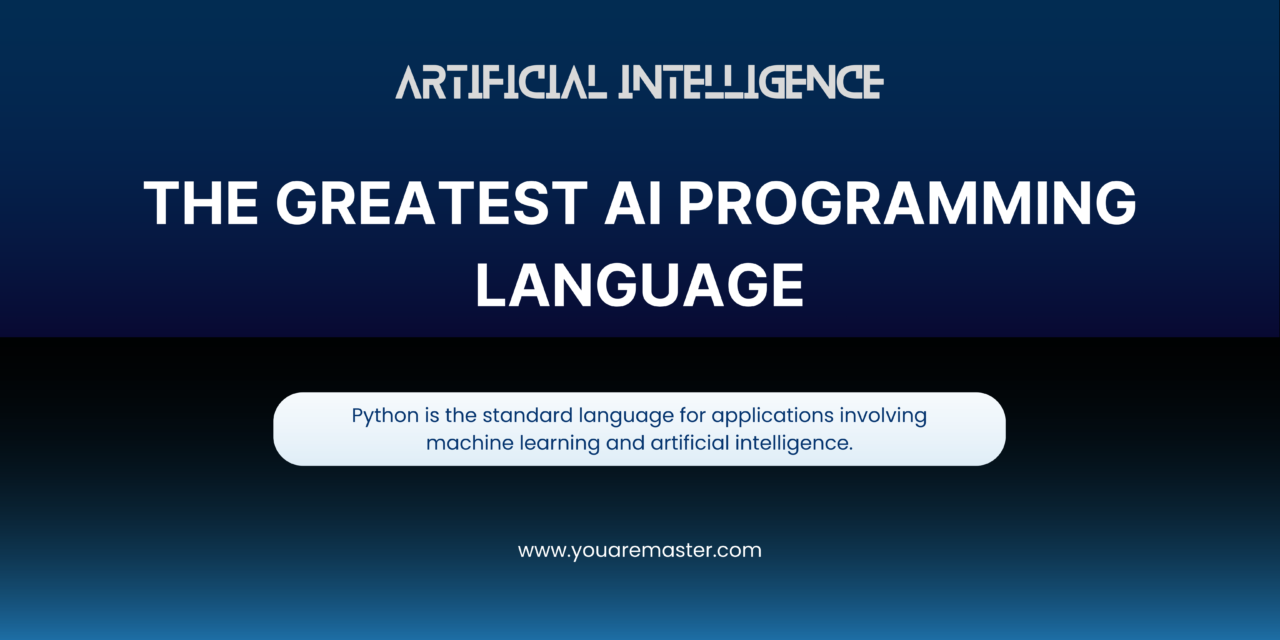The Greatest AI Programming Language
Introduction
The choice of programming language is essential in the ever-evolving field of developing artificial intelligence (AI). Artificial intelligence programming languages are made to withstand the rigours of complex algorithms, data processing, and machine learning models. The top contenders for artificial intelligence programming languages are analysed in this article, along with their benefits, drawbacks, and suitability for various AI uses.
1.Python
Python is the standard language for applications involving machine learning and artificial intelligence. Because of its extensive library, ease of use, and readability, developers with and without expertise may both benefit from using it. Libraries such as scikit-learn, Keras, and TensorFlow enable developers to rapidly and easily create complex AI models. However, in computationally demanding tasks, Python’s interpreted nature could lead to performance snags.

Readability and Simplicity:
- Even for novices, Python is very easy to learn and comprehend because to its simple syntax.
- Developers are encouraged to create code that is not only useful but also intelligible by others because of its emphasis on readability, which fosters cooperation and maintainability.
- Code that is elegant and easy to understand is produced when code blocks are indicated by indentation, which removes the need for superfluous punctuation.
Wide Library Assistance:
- Web development, data processing, machine learning, scientific computing, and more are all covered by the large standard library of Python.
- Additionally, a vast array of third-party frameworks and modules supplement Python’s robust ecosystem, further augmenting its utility and versatility.
- With so many libraries at their disposal, developers may shorten project time-to-market and speed up development by using pre-existing solutions.
Performance considerations:
- Although Python is well known for being easy to understand and simple to use, there has always been a performance issue, especially with CPU-intensive jobs.
- Performance has been greatly improved, though, by improvements in implementations like CPython and optimisations in more recent Python versions.
- Further efficiency optimisation of Python code may be achieved by the use of efficient data structures, generator expressions, and list comprehensions.
- Moreover, developers may attain near-native performance for computationally demanding jobs through integration with performance-oriented libraries like NumPy and Cython.

Overall, Python Is Better for Developing AI
Readability and Simplicity
Python is accessible to developers of all skill levels because to its simple syntax and emphasis on readability, which facilitates quicker development cycles and simpler team communication.
Comprehensive Library Assistance
With its extensive library ecosystem that is specifically designed for AI and machine learning tasks, Python offers pre-built modules and functions for a wide range of AI algorithms, enabling developers to quickly create and implement complex AI models. Notable libraries like TensorFlow, Keras, and scikit-learn are just a few examples of these libraries.
Adaptability Throughout Domains
Python is a useful language for developers working on a variety of projects because of its flexibility, which goes beyond AI into several other disciplines. Its status as the go-to option for AI development is further cemented by its simplicity of integration and interoperability with other technologies.
Equilibrium Strengths
Python is the most popular and reliable language for AI applications to date because of its general mix of simplicity, vast library support, and adaptability—other languages may have certain benefits in particular domains.

2.Java: The Adaptable Choice
Java is a good option for AI development because of its stability and cross-platform compatibility. Java provides an extensive range of tools for data analysis and machine learning, including packages such as Weka and Deeplearning4j. Large-scale AI projects benefit from its robust typing and object-oriented design, which offer stability and scalability. However, some engineers could be put off by Java’s verbosity and challenging learning curve.

3.Scala
The combination of functional and object-oriented paradigms in Scala provides a different way to developing AI. Concurrent and distributed computing jobs benefit greatly from its clear syntax and immutability support. AI projects benefit from Scala’s compatibility with pre-existing Java libraries and its interoperability with Java. However, compared to Python and R, Scala’s acceptance rate in the AI field is still somewhat low.

4.Julia: The Rising Star
Julia stands out as a potential competitor in the field of AI programming languages thanks to her exceptional speed and user-friendliness. Julia blends the ease of high-level scripting languages with the speed of low-level languages, making it ideal for numerical and scientific computing. Its numerous dispatch capabilities and just-in-time (JIT) compilation increase efficiency and productivity in AI jobs. While Julia’s environment is still developing, the language’s rising momentum and community point to a promising future for AI development.

5.TensorFlow: AI using JavaScript and TensorFlow.js
TensorFlow’s deep learning capabilities, together with those of its JavaScript equivalent TensorFlow.js, revolutionise AI development. The widespread use and adaptability of JavaScript also extend to artificial intelligence (AI), allowing edge computing and browser-based machine learning applications. The building of AI models is made easier by TensorFlow’s comprehensive documentation and user-friendly API. However, applications that depend on speed could encounter difficulties since JavaScript is a single-threaded language.
| Language | Strengths | Weaknesses | Suitability |
|---|---|---|---|
| Python | – Simplicity
-Extensive libraries (e.g., TensorFlow, Keras) -Readability -Community support |
– Interpreted nature may lead to performance bottlenecks in intensive tasks | – General-purpose AI development
-Beginner-friendly projects |
| R | – Statistical computing capabilities
-Extensive packages for data analysis -Strong in statistical modeling and visualization |
– Less versatile compared to Python
-Learning curve for beginners |
– Data analysis
-Statistical modeling and visualization |
| Java | – Robustness
-Platform independence -Stability and scalability -Libraries like Weka and Deeplearning4j |
– Verbosity
-Steep learning curve |
– Large-scale AI projects
-Integration with existing systems |
| Scala | – Fusion of functional and object-oriented paradigms
-Concise syntax -Immutability support -Interoperability with Java |
– Modest adoption rate
-Limited compared to Python and R in AI community |
– Concurrent and distributed computing tasks |
| Julia | – Unparalleled performance
-Ease of use -Just-in-time compilation -Growing community |
– Maturing ecosystem
-Limited adoption compared to Python and R |
– Numerical and scientific computing tasks |
| JavaScript | – Ubiquity and versatility
-TensorFlow.js for browser-based ML -Extensive documentation |
– Single-threaded nature may pose challenges for performance-critical apps | – Browser-based ML applications
-Edge computing |
Additional Notable AI Languages
A number of specialised AI programming languages are available outside of the mainstream to serve certain applications and domains. For certain AI tasks, languages like Prologue, Lisp, and Go provide special capabilities and paradigms. Even while they may not be as widely used as Python or Java, they are nonetheless useful resources for AI developers to have in their toolkit for certain use cases.

Selecting the Top Programming Language for AI
The best AI programming language to use relies on a number of variables, including as the needs of the project, the experience of the developers, and performance issues. Developers should evaluate each language’s advantages and disadvantages in relation to the objectives of their projects. Whatever the AI project requirements, there is an appropriate language available to match them, whether it scalability, simplicity, or speed. Making educated choices when it comes to AI language selection requires keeping up with new developments and trends in the industry.
Conclusion
Python is the most popular language for AI and machine learning applications in the ever-changing field of programming languages for AI. Its ease of use, adaptability, and wide ecosystem enable developers to take on challenging AI jobs with confidence. On the other hand, for specialised applications, other languages like R, Java, Scala, Julia, and JavaScript provide distinct strengths and capabilities. Developers can fully utilise AI programming languages to promote innovation and address real-world problems by comprehending the subtleties of each language and matching them with project needs.
FAQs
Which programming language is most suitable for AI novices?
Python’s simplicity and large community support make it the most recommended language for novices.
Is learning various AI programming languages necessary?
Although being multilingual might be advantageous, most AI projects only require a good understanding of one language.
Which are the most important things to think about while selecting an AI programming language?
When choosing a language, performance, usability, library accessibility, and community support are all important factors to take into account.
Are AI programming languages suitable for purposes other than AI?
Yes, a lot of AI languages, such as Java and Python, are adaptable enough to be utilised to a variety of programming jobs outside of AI.

